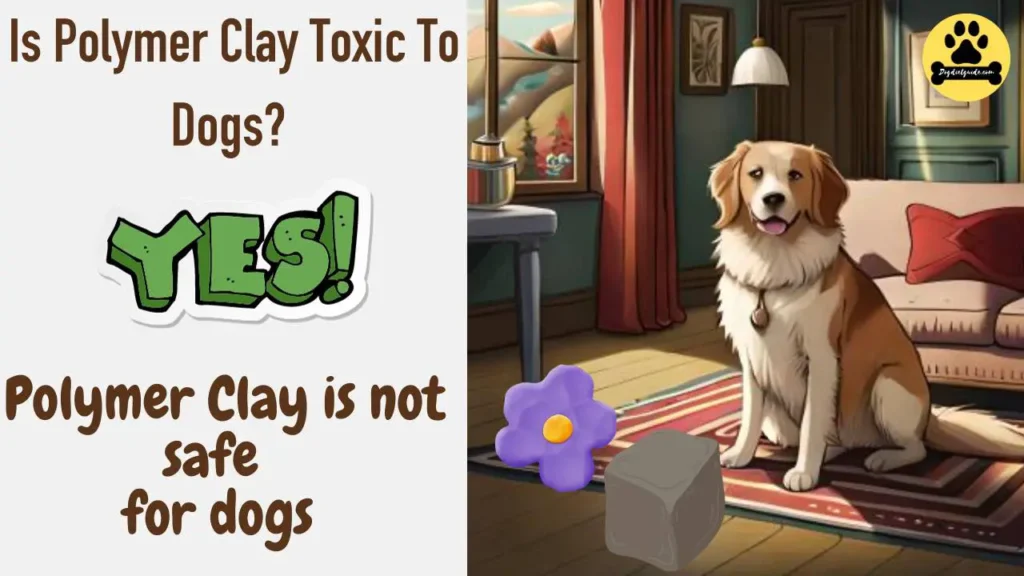Polymer clay has become a popular crafting material in recent years due to its versatility and ease of use. However, if you’re a pet owner, particularly of dogs, it’s crucial to consider the potential risks of this substance. Is polymer clay toxic to dogs?
Polymer clay is not safe for dogs. It contains chemicals that can be harmful if ingested and is not intended to be used as a pet toy or treat. If a dog ingests polymer clay, it could lead to gastrointestinal issues, poisoning, or other health problems.
Overview
| Aspect | Polymer Clay Toxicity to Dogs |
|---|---|
| Ingestion | Highly Toxic |
| Chemical Composition | Contains PVC, Phthalates, and other harmful chemicals |
| Potential Risks | Gastrointestinal blockages, organ damage, toxicity |
| Symptoms of Exposure | Vomiting, diarrhea, lethargy, loss of appetite |
| Treatment | Immediate veterinary attention required |
| Prevention | Keep polymer clay out of reach, use non-toxic alternatives |
Is Polymer Clay Toxic To Dogs?
Yes, polymer clay toxic to dogs. Chemicals in polymer clay, such as PVC resin and plasticizers, can be toxic to canines. If a dog ingests polymer clay, it could lead to digestive issues, including stomach upset, vomiting, diarrhea, and potentially more serious complications.
The toxic chemicals in the clay may have long-term effects on a dog’s health, potentially affecting their nervous system, liver, and kidneys.
In severe cases, it could even lead to an intestinal blockage, a serious medical emergency.
If you suspect your furry friend has ingested polymer clay or any other potentially toxic substance, immediately contact your veterinarian or a local animal poison control center.

Polymer Clay Toxic Components For Dogs
The primary concern regarding polymer clay and dogs lies in its chemical composition. PVC, a key component, contains phthalates and other chemicals that can be harmful when ingested.
Moreover, the pigments and fillers used in polymer clay may contain heavy metals like cadmium and lead, which are highly toxic to humans and animals.
What To Do If A Dog Ate Polymer Clay?
If your furry friend has ingested polymer clay, acting quickly is important. Polymer clay is not intended for consumption and can be harmful to pets. Here’s what you should do:
-
Contact a veterinarian: Please contact your veterinarian promptly. They will offer tailored guidance considering your dog’s size, breed, and the quantity of clay consumed.
-
Provide Information: Tell the vet the brand and type of polymer clay your dog ingested and, if possible, the quantity. This Information will help them assess the potential risk.
-
Observe Your Dog: Monitor your dog closely for any signs of distress or discomfort. Symptoms can include vomiting, diarrhea, abdominal pain, loss of appetite, or behavioral changes.
-
Do Not Induce Vomiting: Do not try to induce vomiting without the explicit instruction of a veterinarian. Some substances can cause more harm when brought back up.
-
Follow Vet’s Advice: Your vet may advise you to bring your dog in for an examination or give specific instructions for at-home care. It’s crucial to follow their guidance closely.
-
Monitor for Any Changes: Watch for any changes in behavior, appetite, or bowel movements over the next 24-48 hours. If you observe anything worrisome, please get in touch with your vet promptly.
Related Post: Is Turkey Hearts Safe for Dogs?
Symptoms of Polymer Clay Ingestion
Identifying the signs of polymer clay ingestion is crucial for prompt action.
Watch out for symptoms like excessive drooling, lethargy, loss of appetite, abdominal pain, or changes in behavior.
If you suspect your dog has ingested polymer clay, seeking immediate veterinary attention is imperative.
Preventive Measures
To ensure the safety of your canine companion, it’s essential to take proactive steps:
-
Store polymer clay in a secure, elevated location where your dog cannot access it.
-
When working with polymer clay, ensure your dog is in a separate, well-ventilated area to minimize the risk of exposure.
-
Clean up any clay scraps or residue promptly to prevent accidental ingestion.
-
Consider using pet-safe materials to eliminate the risk altogether for your crafting projects.
Related Post: Are Buffalo Horns Good For Dogs?
FAQs
Can dogs safely play with polymer clay?
No, it’s not safe for dogs to play with polymer clay due to the risk of ingestion and toxicity.
Are there any non-toxic alternatives to polymer clay?
Yes, consider using natural clays, vegetable-based dyes, and organic fibers for pet-friendly crafting projects.
How can I prevent my dog from accessing polymer clay?
Store crafting supplies in secure containers and supervise your dog during crafting activities to prevent accidental ingestion.
What are the common symptoms of polymer clay toxicity in dogs?
Common symptoms include gastrointestinal distress, lethargy, drooling, loss of appetite, and neurological abnormalities.
Is it safe to use polymer clay around dogs?
It’s best to avoid using polymer clay around dogs to minimize the risk of exposure and ingestion.
Final Thoughts
The answer to the question, “Is polymer clay toxic to dogs?” is a resounding yes. The chemicals present in polymer clay can pose severe risks to your beloved pet’s health.
By being aware of these dangers and implementing the necessary safety measures, you can enjoy crafting endeavors without compromising your dog’s well-being. Remember, a vigilant approach is the key to keeping your furry friend safe and happy.










![Can Dogs Eat Blood? 7 Side Effects [Expert Opinion]](https://petskor.com/wp-content/uploads/2022/04/Webp.net-resizeimage-12.jpg)
